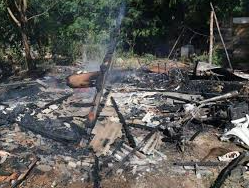
Arakan Army Seizes Control of Northern Rakhine State Following Brutal Confrontation
The Myanmar military’s control of its western border has come to an end following a devastating siege by the Arakan Army (AA). The intense confrontation concluded with the destruction of the BGP5 barracks, a key military outpost in northern Rakhine State near the Bangladesh border.
The siege, marked by relentless artillery bombardment and firefights, saw the AA’s forces encircle the BGP5 compound, which housed hundreds of soldiers. Footage shared by the AA depicted their fighters advancing under constant fire, with air force jets overhead as they pushed toward the stronghold. Despite the heavy defences—including thousands of landmines and reinforced bunkers—the AA maintained its offensive, leading to the military’s eventual surrender.
This defeat represents a significant blow to Myanmar’s ruling military junta, which has faced repeated setbacks since its 2021 coup. The loss of BGP5 leaves the entire 270km border with Bangladesh under AA control. This marks the first time an insurgent group has secured full control of an entire Myanmar state since the coup, further deepening the military’s weakening grip.
Reports indicate that over 450 soldiers died during the siege, with the AA broadcasting images of captured commanders surrendering under their flag. Myanmar’s military has struggled to sustain its positions amid logistical challenges and demoralisation, with supply shortages exacerbated by constant bombardments and isolation.
The AA, originally formed in 2009, is a disciplined and well-equipped insurgent force bolstered by alliances and supplies from insurgent groups along Myanmar’s Chinese border. While primarily focused on regional self-rule, their success has shifted attention to broader questions about their role and ambitions in Myanmar’s fractured political landscape.
Displaced Rohingya populations, already victims of systemic persecution and military campaigns in the past, now find themselves caught in the AA’s new administration and shifting territorial control. Reports from the region suggest that many Rohingya communities have been expelled by the AA from newly captured areas, further complicating humanitarian concerns.
The United Nations has warned of an impending famine as aid deliveries are obstructed by military blockades and conflict. Despite the AA’s promises to provide governance for all ethnic groups, tensions remain high, particularly with the Rohingya, who have historically faced marginalisation and violence in Myanmar.
The AA’s victory signals both a significant blow to Myanmar’s military government and an uncertain future for the region, with ethnic divisions, geopolitical manoeuvres, and humanitarian challenges all converging.










